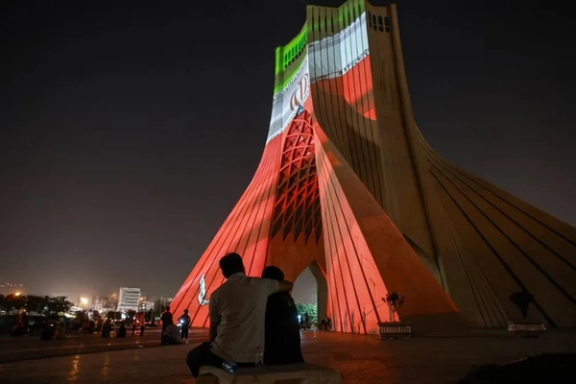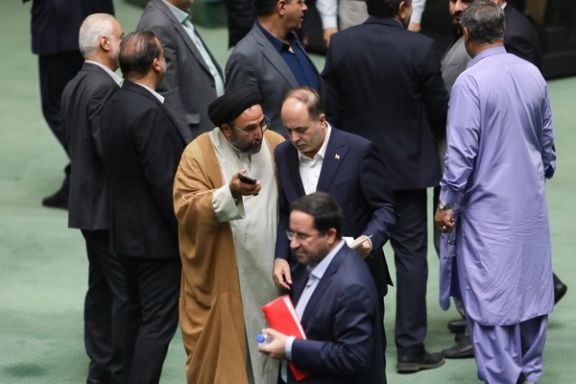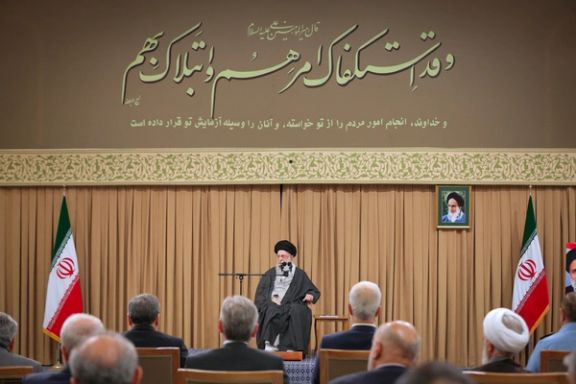Hardliners and ultra-hardliners in Tehran, who have long dismissed the 2015 nuclear deal (JCPOA) as a “total failure,” downplayed the impact of the UN’s decision. For them, renewed sanctions are little more than symbolic.
“In the past, sanctions far harsher than these have been imposed; this is simply a psychological tactic intended to impact our economy,” hardline lawmaker Hosseinali Haji-Deligani told ILNA.
Meanwhile, Kayhan newspaper, linked to the Supreme Leader’s office, and other hardline outlets such as Vatan-e Emrouz have urged Tehran to withdraw from the Nuclear Non-Proliferation Treaty (NPT).
In an editorial titled “Is it still not time to leave the NPT after 22 years of costly negotiations?!” the paper argued for building a bomb to “fully strengthen national deterrence.”
Ahmad Naderi, a member of parliament’s presiding board, echoed this stance, insisting that “acquiring nuclear weapons is the only way to preserve Iran’s territorial integrity and national security.”
“Withdrawing from the NPT, adopting a policy of ambiguity and ultimately testing the atomic bomb is the only option that can spare Iran the fate of Iraq and Libya,” said Naderi.
“Experience has shown that countries without nuclear deterrence eventually become victims of invasion or regime change. The time has come to make hard but necessary decisions.”
Warning of a deepening crisis, push for policy change
Others caution that the impact will be severe. Journalist Azadeh Mokhtari argued on social media that the Iranian people will once again bear the brunt of political maneuvering: “The return of UN sanctions means increased economic pressure, reduced access to essential goods and medicine, and a deepening livelihood crisis.”
Meanwhile, reformists are calling for urgent diplomacy. Azar Mansouri, head of the Reform Front, warned that “immediate and maximal use of diplomatic capacity to prevent a global consensus against Iran is an unavoidable necessity.”
She stressed that the window of opportunity for negotiations is closing fast, with reinstated UN resolutions carrying “wide-ranging international consequences.”
Ebrahim Asgharzadeh, a reformist politician, went further, telling Etemad newspaper: “Iran stands on the brink of a historic choice: either insist on the illusion of costly deterrence and a single-track foreign policy, which yields nothing but isolation and domestic erosion, or acknowledge the reality of rival powers.”
He added that the world today is “waiting for a change in Iran’s language and behavior, not a repetition or justification of the past.”
Doubts over Russia and China
Hardliners often argue that Russia and China will help Iran weather sanctions. Yet that view has drawn criticism even from conservative voices. Journalist Ali Gholhaki dismissed the notion: “At least in China’s case, it’s just empty talk! Industrial and economic managers understand the reason well. They have seen examples of this in just the past few days.”
Mohammad-Ali Hanaei, head of the Nations Diplomacy Think Tank, told Etemad that Beijing profits from buying Iranian oil cheaply and has little incentive to back sanctions relief. He urged Tehran to consider “logical restrictions” as a way to manage the crisis.
Moscow has suggested it might mediate. Mikhail Ulyanov, Russia’s envoy to international organizations in Vienna, told Al Mayadeen that Russia and China are preparing a joint initiative to resolve the crisis, though he offered no details.
Diplomatic openings still possible?
Some experts still see potential for compromise. Economics professor Alireza Soltani told Khabar Online that the diplomatic window is not yet closed, while cautioning against “emotional reactions.”
Even if previous UN resolutions are reinstated, he argued, a comprehensive deal remains possible “provided there is political will from both Iran and the United States.”
Foreign policy analyst Morteza Makki raised the possibility of a “miracle” if Tehran can strike a temporary arrangement with the E3 (Britain, France, and Germany) in the coming days or at the UN General Assembly.
Pezeshkian-Trump Meeting Debate
At home, debate is intensifying over whether President Masoud Pezeshkian should meet US President Donald Trump during his upcoming trip to New York.
Reformist cleric Mohammad-Taghi Fazel-Meybodi called such a meeting “the last chance of the system,” recalling that a missed opportunity between Mohammad Khatami and Bill Clinton two decades ago paved the way for today’s sanctions.
Yet many doubt Supreme Leader Ali Khamenei will allow it, having denied similar requests from both Khatami and Hassan Rouhani.


















